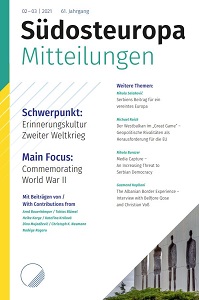The Second World War in Turkish Memorial Culture
The Second World War in Turkish Memorial Culture
Author(s): Christoph K. NeumannSubject(s): History, Sociology of Culture, WW II and following years (1940 - 1949)
Published by: Südosteuropa Gesellschaft e.V.
Keywords: Turkey; WWII; Memory culture in Turkey;radicalisation of Turkish state-nationalism;the Kemalist state nationalism;
Summary/Abstract: Though Turkey did not fight in the Second World War, it was deeply affected by it. Only few events and processes that relate to the era are present today in public and political memory. The author considers a number of issues that have retained a degree of prominence: German exiled scholars and the construction of a modern university system, the so-called tragedy of the Struma (Struma faciası) in the context of the Jewish Holocaust, the “Tax on Wealth” (Varlık Vergisi), the radicalisation of Turkish state-nationalism and the emerging rift in Turkish nationalism as well as the trial of May 3rd, 1944. All of these events can be read through the prism of historical change in nationalism, arguably the most valiant ideology in Turkey to this day. Critical historiographical debates on the events and developments in question exist. However, they appear to only have a very limited impact on memory construction. For this reason, the observation that the Kemalist state nationalism of the era became more exclusive and hostile towards ethnic and religious groups not fitting the paradigm of Muslim Turks, is often missed in retrospect. To the contrary, the simultaneous emergence of a radical nationalist opposition makes the mainstream construction of identity seem more lenient than it de facto has been.
Journal: Südosteuropa Mitteilungen
- Issue Year: 61/2021
- Issue No: 02-03
- Page Range: 119-130
- Page Count: 12
- Language: English
- Content File-PDF

